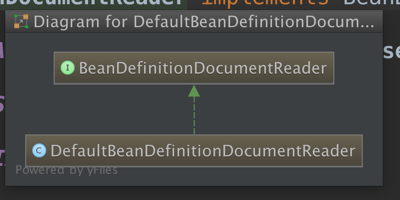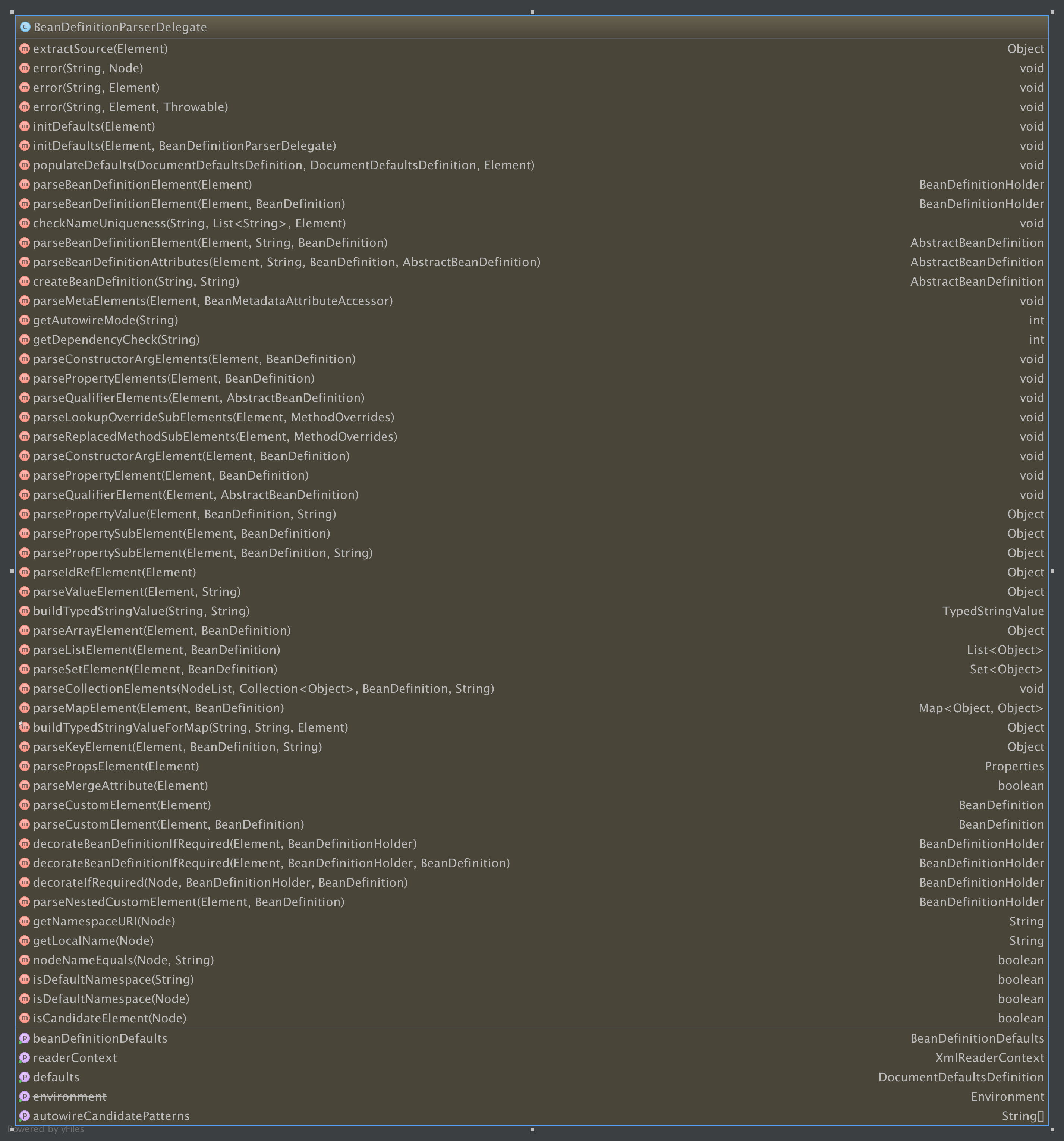Spring 启动记录(8)
2017-01-15 00:00
190 查看
摘要: spring XmlBeanDefinitionReader DefaultBeanDefinitionDocumentReader
Spring DefaultBeanDefinitionDocumentReader注册BeanDifinition
1、

、
此图继承图,只是简单一个接口一个实现类

Spring DefaultBeanDefinitionDocumentReader注册BeanDifinition
1、

、
此图继承图,只是简单一个接口一个实现类
/* * Copyright 2002-2015 the original author or authors. * * Licensed under the Apache License, Version 2.0 (the "License"); * you may not use this file except in compliance with the License. * You may obtain a copy of the License at * * http://www.apache.org/licenses/LICENSE-2.0 * * Unless required by applicable law or agreed to in writing, software * distributed under the License is distributed on an "AS IS" BASIS, * WITHOUT WARRANTIES OR CONDITIONS OF ANY KIND, either express or implied. * See the License for the specific language governing permissions and * limitations under the License. */ package org.springframework.beans.factory.xml; import java.io.IOException; import java.net.URISyntaxException; import java.util.LinkedHashSet; import java.util.Set; import org.apache.commons.logging.Log; import org.apache.commons.logging.LogFactory; import org.w3c.dom.Document; import org.w3c.dom.Element; import org.w3c.dom.Node; import org.w3c.dom.NodeList; import org.springframework.beans.factory.BeanDefinitionStoreException; import org.springframework.beans.factory.config.BeanDefinitionHolder; import org.springframework.beans.factory.parsing.BeanComponentDefinition; import org.springframework.beans.factory.support.BeanDefinitionReaderUtils; import org.springframework.core.io.Resource; import org.springframework.core.io.support.ResourcePatternUtils; import org.springframework.util.ResourceUtils; import org.springframework.util.StringUtils; /** * Default implementation of the {@link BeanDefinitionDocumentReader} interface that * reads bean definitions according to the "spring-beans" DTD and XSD format * (Spring's default XML bean definition format). * * <p>The structure, elements, and attribute names of the required XML document * are hard-coded in this class. (Of course a transform could be run if necessary * to produce this format). {@code <beans>} does not need to be the root * element of the XML document: this class will parse all bean definition elements * in the XML file, regardless of the actual root element. * * @author Rod Johnson * @author Juergen Hoeller * @author Rob Harrop * @author Erik Wiersma * @since 18.12.2003 */ public class DefaultBeanDefinitionDocumentReader implements BeanDefinitionDocumentReader { public static final String BEAN_ELEMENT = BeanDefinitionParserDelegate.BEAN_ELEMENT; public static final String NESTED_BEANS_ELEMENT = "beans"; public static final String ALIAS_ELEMENT = "alias"; public static final String NAME_ATTRIBUTE = "name"; public static final String ALIAS_ATTRIBUTE = "alias"; public static final String IMPORT_ELEMENT = "import"; public static final String RESOURCE_ATTRIBUTE = "resource"; public static final String PROFILE_ATTRIBUTE = "profile"; protected final Log logger = LogFactory.getLog(getClass()); private XmlReaderContext readerContext; private BeanDefinitionParserDelegate delegate; /** * This implementation parses bean definitions according to the "spring-beans" XSD * (or DTD, historically). * <p>Opens a DOM Document; then initializes the default settings * specified at the {@code <beans/>} level; then parses the contained bean definitions. */ @Override public void registerBeanDefinitions(Document doc, XmlReaderContext readerContext) { this.readerContext = readerContext; logger.debug("Loading bean definitions"); Element root = doc.getDocumentElement(); doRegisterBeanDefinitions(root); } /** * Return the descriptor for the XML resource that this parser works on. */ protected final XmlReaderContext getReaderContext() { return this.readerContext; } /** * Invoke the {@link org.springframework.beans.factory.parsing.SourceExtractor} to pull the * source metadata from the supplied {@link Element}. */ protected Object extractSource(Element ele) { return getReaderContext().extractSource(ele); } /** * Register each bean definition within the given root {@code <beans/>} element. * 注册BeanDifinition的方法 */ protected void doRegisterBeanDefinitions(Element root) { // Any nested <beans> elements will cause recursion in this method. In // order to propagate and preserve <beans> default-* attributes correctly, // keep track of the current (parent) delegate, which may be null. Create // the new (child) delegate with a reference to the parent for fallback purposes, // then ultimately reset this.delegate back to its original (parent) reference. // this behavior emulates a stack of delegates without actually necessitating one. BeanDefinitionParserDelegate parent = this.delegate; //调用了BeanDefinitionParserDelegate这个类去解析 this.delegate = createDelegate(getReaderContext(), root, parent); if (this.delegate.isDefaultNamespace(root)) { //判读xml的xmlns是否等于http://www.springframework.org/schema/beans
//判断是否有profile属性,属于哪个环境
String profileSpec = root.getAttribute(PROFILE_ATTRIBUTE);
if (StringUtils.hasText(profileSpec)) {
String[] specifiedProfiles = StringUtils.tokenizeToStringArray(
profileSpec, BeanDefinitionParserDelegate.MULTI_VALUE_ATTRIBUTE_DELIMITERS);
if (!getReaderContext().getEnvironment().acceptsProfiles(specifiedProfiles)) {
return;
}
}
}
preProcessXml(root);
parseBeanDefinitions(root, this.delegate);
postProcessXml(root);
this.delegate = parent;
}
//创建BeanDefinitionParserDelegate
protected BeanDefinitionParserDelegate createDelegate(
XmlReaderContext readerContext, Element root, BeanDefinitionParserDelegate parentDelegate) {
BeanDefinitionParserDelegate delegate = new BeanDefinitionParserDelegate(readerContext);
//初始化信息
delegate.initDefaults(root, parentDelegate);public void initDefaults(Element root, BeanDefinitionParserDelegate parent) {
populateDefaults(this.defaults, (parent != null ? parent.defaults : null), root);
//通知注册的监听器,(spring的beans对应的BeanDefinition初始化完成已完成此时)
this.readerContext.fireDefaultsRegistered(this.defaults);
}BeanDefinitionParserDelegate的方法
public void initDefaults(Element root, BeanDefinitionParserDelegate parent) {
populateDefaults(this.defaults, (parent != null ? parent.defaults : null), root);
this.readerContext.fireDefaultsRegistered(this.defaults);
}/** * Populate the given DocumentDefaultsDefinition instance with the default lazy-init, * autowire, dependency check settings, init-method, destroy-method and merge settings. * Support nested 'beans' element use cases by falling back to <literal>parentDefaults</literal> * in case the defaults are not explicitly set locally. * @param defaults the defaults to populate * @param parentDefaults the parent BeanDefinitionParserDelegate (if any) defaults to fall back to * @param root the root element of the current bean definition document (or nested beans element) 给每个xml的表情<beans>lazy-init, * autowire, dependency check settings, init-method, destroy-method and merge默认值
public static final String DEFAULT_LAZY_INIT_ATTRIBUTE = "default-lazy-init"; public static final String DEFAULT_MERGE_ATTRIBUTE = "default-merge"; public static final String DEFAULT_AUTOWIRE_ATTRIBUTE = "default-autowire"; public static final String DEFAULT_DEPENDENCY_CHECK_ATTRIBUTE = "default-dependency-check"; public static final String DEFAULT_AUTOWIRE_CANDIDATES_ATTRIBUTE = "default-autowire-candidates"; public static final String DEFAULT_INIT_METHOD_ATTRIBUTE = "default-init-method"; public static final String DEFAULT_DESTROY_METHOD_ATTRIBUTE = "default-destroy-method";
*/
protected void populateDefaults(DocumentDefaultsDefinition defaults, DocumentDefaultsDefinition parentDefaults, Element root) {
String lazyInit = root.getAttribute(DEFAULT_LAZY_INIT_ATTRIBUTE);
if (DEFAULT_VALUE(default).equals(lazyInit)) {
// Potentially inherited from outer <beans> sections, otherwise falling back to false.
//如果有父类的解析器,则读取父类的配置,没有就是false
lazyInit = (parentDefaults != null ? parentDefaults.getLazyInit() : FALSE_VALUE(false));
}
defaults.setLazyInit(lazyInit);
String merge = root.getAttribute(DEFAULT_MERGE_ATTRIBUTE);
if (DEFAULT_VALUE.equals(merge)) {
// Potentially inherited from outer <beans> sections, otherwise falling back to false.
merge = (parentDefaults != null ? parentDefaults.getMerge() : FALSE_VALUE);
}
//设置merge配置
defaults.setMerge(merge);
String autowire = root.getAttribute(DEFAULT_AUTOWIRE_ATTRIBUTE);
if (DEFAULT_VALUE.equals(autowire)) {
// Potentially inherited from outer <beans> sections, otherwise falling back to 'no'.
autowire = (parentDefaults != null ? parentDefaults.getAutowire() : AUTOWIRE_NO_VALUE);
}
defaults.setAutowire(autowire);
// Don't fall back to parentDefaults for dependency-check as it's no longer supported in
// <beans> as of 3.0. Therefore, no nested <beans> would ever need to fall back to it.
//此处对与dependencyCheck配置从spring3.0开始不再支持父类解析器配置属性继承只读取子类的配置
defaults.setDependencyCheck(root.getAttribute(DEFAULT_DEPENDENCY_CHECK_ATTRIBUTE));
if (root.hasAttribute(DEFAULT_AUTOWIRE_CANDIDATES_ATTRIBUTE)) {
defaults.setAutowireCandidates(root.getAttribute(DEFAULT_AUTOWIRE_CANDIDATES_ATTRIBUTE));
}
else if (parentDefaults != null) {
defaults.setAutowireCandidates(parentDefaults.getAutowireCandidates());
}
if (root.hasAttribute(DEFAULT_INIT_METHOD_ATTRIBUTE)) {
defaults.setInitMethod(root.getAttribute(DEFAULT_INIT_METHOD_ATTRIBUTE));
}
else if (parentDefaults != null) {
defaults.setInitMethod(parentDefaults.getInitMethod());
}
if (root.hasAttribute(DEFAULT_DESTROY_METHOD_ATTRIBUTE)) {
defaults.setDestroyMethod(root.getAttribute(DEFAULT_DESTROY_METHOD_ATTRIBUTE));
}
else if (parentDefaults != null) {
defaults.setDestroyMethod(parentDefaults.getDestroyMethod());
}
defaults.setSource(this.readerContext.extractSource(root));
}return delegate;
}
/**
* Parse the elements at the root level in the document:
* "import", "alias", "bean".
* @param root the DOM root element of the document
*/
protected void parseBeanDefinitions(Element root, BeanDefinitionParserDelegate delegate) {
if (delegate.isDefaultNamespace(root)) {
NodeList nl = root.getChildNodes();
for (int i = 0; i < nl.getLength(); i++) {
Node node = nl.item(i);
if (node instanceof Element) {
Element ele = (Element) node;
if (delegate.isDefaultNamespace(ele)) {
parseDefaultElement(ele, delegate);
}
else {
delegate.parseCustomElement(ele);
}
}
}
}
else {
delegate.parseCustomElement(root);
}
}
private void parseDefaultElement(Element ele, BeanDefinitionParserDelegate delegate) {
if (delegate.nodeNameEquals(ele, IMPORT_ELEMENT)) {
importBeanDefinitionResource(ele);
}
else if (delegate.nodeNameEquals(ele, ALIAS_ELEMENT)) {
processAliasRegistration(ele);
}
else if (delegate.nodeNameEquals(ele, BEAN_ELEMENT)) {
processBeanDefinition(ele, delegate);
}
else if (delegate.nodeNameEquals(ele, NESTED_BEANS_ELEMENT)) {
// recurse
doRegisterBeanDefinitions(ele);
}
}
/**
* Parse an "import" element and load the bean definitions
* from the given resource into the bean factory.
*/
protected void importBeanDefinitionResource(Element ele) {
String location = ele.getAttribute(RESOURCE_ATTRIBUTE);
if (!StringUtils.hasText(location)) {
getReaderContext().error("Resource location must not be empty", ele);
return;
}
// Resolve system properties: e.g. "${user.dir}"
location = getReaderContext().getEnvironment().resolveRequiredPlaceholders(location);
Set<Resource> actualResources = new LinkedHashSet<Resource>(4);
// Discover whether the location is an absolute or relative URI
boolean absoluteLocation = false;
try {
absoluteLocation = ResourcePatternUtils.isUrl(location) || ResourceUtils.toURI(location).isAbsolute();
}
catch (URISyntaxException ex) {
// cannot convert to an URI, considering the location relative
// unless it is the well-known Spring prefix "classpath*:"
}
// Absolute or relative?
if (absoluteLocation) {
try {
int importCount = getReaderContext().getReader().loadBeanDefinitions(location, actualResources);
if (logger.isDebugEnabled()) {
logger.debug("Imported " + importCount + " bean definitions from URL location [" + location + "]");
}
}
catch (BeanDefinitionStoreException ex) {
getReaderContext().error(
"Failed to import bean definitions from URL location [" + location + "]", ele, ex);
}
}
else {
// No URL -> considering resource location as relative to the current file.
try {
int importCount;
Resource relativeResource = getReaderContext().getResource().createRelative(location);
if (relativeResource.exists()) {
importCount = getReaderContext().getReader().loadBeanDefinitions(relativeResource);
actualResources.add(relativeResource);
}
else {
String baseLocation = getReaderContext().getResource().getURL().toString();
importCount = getReaderContext().getReader().loadBeanDefinitions(
StringUtils.applyRelativePath(baseLocation, location), actualResources);
}
if (logger.isDebugEnabled()) {
logger.debug("Imported " + importCount + " bean definitions from relative location [" + location + "]");
}
}
catch (IOException ex) {
getReaderContext().error("Failed to resolve current resource location", ele, ex);
}
catch (BeanDefinitionStoreException ex) {
getReaderContext().error("Failed to import bean definitions from relative location [" + location + "]",
ele, ex);
}
}
Resource[] actResArray = actualResources.toArray(new Resource[actualResources.size()]);
getReaderContext().fireImportProcessed(location, actResArray, extractSource(ele));
}
/**
* Process the given alias element, registering the alias with the registry.
*/
protected void processAliasRegistration(Element ele) {
String name = ele.getAttribute(NAME_ATTRIBUTE);
String alias = ele.getAttribute(ALIAS_ATTRIBUTE);
boolean valid = true;
if (!StringUtils.hasText(name)) {
getReaderContext().error("Name must not be empty", ele);
valid = false;
}
if (!StringUtils.hasText(alias)) {
getReaderContext().error("Alias must not be empty", ele);
valid = false;
}
if (valid) {
try {
getReaderContext().getRegistry().registerAlias(name, alias);
}
catch (Exception ex) {
getReaderContext().error("Failed to register alias '" + alias +
"' for bean with name '" + name + "'", ele, ex);
}
getReaderContext().fireAliasRegistered(name, alias, extractSource(ele));
}
}
/**
* Process the given bean element, parsing the bean definition
* and registering it with the registry.
*/
protected void processBeanDefinition(Element ele, BeanDefinitionParserDelegate delegate) {
BeanDefinitionHolder bdHolder = delegate.parseBeanDefinitionElement(ele);
if (bdHolder != null) {
bdHolder = delegate.decorateBeanDefinitionIfRequired(ele, bdHolder);
try {
// Register the final decorated instance.
BeanDefinitionReaderUtils.registerBeanDefinition(bdHolder, getReaderContext().getRegistry());
}
catch (BeanDefinitionStoreException ex) {
getReaderContext().error("Failed to register bean definition with name '" +
bdHolder.getBeanName() + "'", ele, ex);
}
// Send registration event.
getReaderContext().fireComponentRegistered(new BeanComponentDefinition(bdHolder));
}
}
/**
* Allow the XML to be extensible by processing any custom element types first,
* before we start to process the bean definitions. This method is a natural
* extension point for any other custom pre-processing of the XML.
* <p>The default implementation is empty. Subclasses can override this method to
* convert custom elements into standard Spring bean definitions, for example.
* Implementors have access to the parser's bean definition reader and the
* underlying XML resource, through the corresponding accessors.
* @see #getReaderContext()
*/
protected void preProcessXml(Element root) {
}
/**
* Allow the XML to be extensible by processing any custom element types last,
* after we finished processing the bean definitions. This method is a natural
* extension point for any other custom post-processing of the XML.
* <p>The default implementation is empty. Subclasses can override this method to
* convert custom elements into standard Spring bean definitions, for example.
* Implementors have access to the parser's bean definition reader and the
* underlying XML resource, through the corresponding accessors.
* @see #getReaderContext()
*/
protected void postProcessXml(Element root) {
}
}
相关文章推荐
- 一个Spring启动时找不到类的问题修复记录
- Spring 启动记录(4)
- spring3+mybatis3框架整合 启动错误记录
- Spring 启动记录(3)
- Spring 启动记录(9)
- Spring 启动记录(7)
- spring-boot笔记-日志记录、启动加载、定时任务(五)
- Spring 启动记录(2)
- Spring 启动记录(5)
- Spring 启动记录(10)
- [问题记录] spring-boot 打印启动时间
- Spring 启动记录(6)
- Spring 启动记录(12)
- Spring 框架启动之 BUG 记录_unfinish
- Spring 启动记录(7)
- MVC中Spring配置以及程序启动出现错误记录
- Spring 启动记录(11)
- spring+hibernate+struts启动出错解决方法。
- spring+hibernate+struts启动出错: ERROR org.hibernate.proxy.BasicLazyInitializer - CGLIB Enhancement failed: com.lzy.data.bo.Custo
- 关于用spring 用jndi链接sqlserver2000,tomcat6的记录,烦了我20个小时的东西,原来这么简单。
